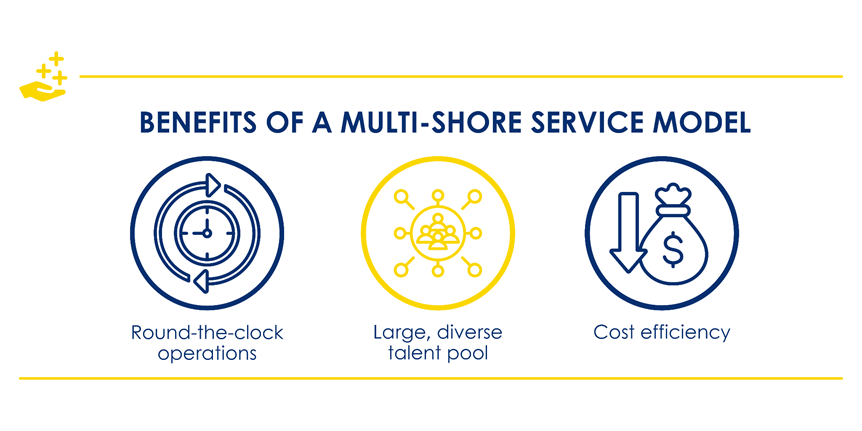3 Essentials to Building a Customer-Focused Consulting Staff in a Multi-Shore Service Model

Our human resources department (HR) oversees a global workforce of over 300 Corbus employees who are primarily located across the United States and India. Using a multi-shore service model, our employees make up a dynamic, customer-focused consulting staff with the agility and expertise to exceed client expectations.
This combination of team structure and business model benefits our business, our staff and our clients. But what exactly does it look like? And how does it work?
Read on to learn what a customer-focused consulting staff and a multi-shore service model are, their benefits internally and externally, and three essentials for finding success using this type of model.
Customer-focused consulting staff enables successful customer engagement.
A customer-focused consulting staff is a workforce of people who internalize their customer’s culture and goals and work alongside them to improve the customer’s business and achieve their goals.
When our employees are invested in forging strong relationships and generating positive outcomes with our clients, our business and reputation benefit.
Our employees are just that — employees, not temps or contractors. We stand behind our staff, develop their expertise and retain them long-term.
For our clients, this means that they can trust our staff has a core knowledge base and brings credibility, stability and expertise to every initiative. That level of experience, combined with their commitment to client success, is a key point of differentiation for Corbus.
Multi-shore service model delivers flexibility, diversity of talent and budget friendliness.
A multi-shore service model uses a blend of on- and off-shore resources, leveraging teams across geographical locations to deliver the best solutions to achieve a customer’s goals.
This model goes beyond its expanded scale. Its strategic approach encompasses:
- A diverse pool of global talent to ensure the right mix of expertise
- A continuous development and operation support cycle that accelerates project delivery
- A commitment to maximizing cost efficiency without sacrificing quality

Many of the benefits of a multi-shore model are externally facing. Because a multi-shore model covers different time zones, we can facilitate very responsive, around-the-clock operations and support that ensures continuous progress and expedites project delivery. We’re able to tap into a larger pool of resources, which reduces costs, mitigates risk and accelerates time-to-market for our clients.
Corbus understands how to manage resources from a global perspective and still maintains complete control across all aspects of the work. These elements allow us to provide transformative solutions and incredible value to our clients.
From an internal perspective, this approach requires highly functioning yet flexible systems and regular, open communication. That said, having a global reach gives us a wider footprint to expand to new areas and explore more business development opportunities. It also elevates the diversity of our talent and ensures new perspectives.
Three essentials for successful multi-shore resource management.
To be successful, our HR department adapts to changing business demands and understands the nuances that exist across our business, our team and our clients. We run lean, but that means our team has both a strategic perspective and a tactical approach — all while remaining incredibly flexible. These are three essentials that help us find success:

At their core, our talent has the necessary skills to deliver effective solutions. They possess deep technical expertise and strong interpersonal skills, whether in the area of supply chain, sourcing and procurement, project management or information technology. To work well within a customer-focused consulting team and a multi-shore service model, our employees must be able to work autonomously, either remotely or on-site, and be confident in their skills and expertise.
We also understand that our talent pool must reflect our clients’ needs. Our hiring success is a testament to the tenacity of our internal recruitment team. They truly understand Corbus and our clients and work closely with stakeholders to find the right combination of skills to meet our clients’ needs.
To find the right talent, we incorporate behavioral questions into our interview process to see how candidates personally approach different situations, how they deal with adversity and how they demonstrate various soft skills. We need to know there is synergy between Corbus and client teams.
We are also committed to developing talent. While many of our leadership and team members have decades of experience, we also hire at the more junior level. We develop and coach new hires, giving them an opportunity to move up and transition to different roles and projects as they build their experience and skills.
In India, we launched a two-year program to train and assess junior-level talent in our supply chain division. It includes an annual review with specific measures and set opportunities for promotions and salary increases. While many companies see junior-level employees leave for new opportunities, this type of program builds loyalty and team stability. It gives our employees a process with milestones and goals to work toward, which means they are more invested in growing within our company.

We want to make working at and with Corbus a productive, positive experience. A big part of that is our culture.
Corbus staff build dynamic relationships with our clients because they embrace and live our customer-focus value. They feel good about the work they do and the people they work with. Our multi-shore model offers plenty of autonomy, flexibility and empowerment. Our staff enjoys a sense of ownership while working within a high-accountability culture—without being micromanaged.
Our flat team structure provides junior-level employees with the opportunity to work closely with senior-level executives. They learn and grow in an environment of transparency and collaboration. That level of accessibility in working with senior-level leadership, often on larger, global clients, is an experience new hires cannot receive at many other companies.

This type of model isn’t for the faint of heart. In building our ideal global staff, we have learned many lessons. The biggest lesson: Be prepared for the unknown and open to learning. You truly don’t know what you don’t know.
From a tactical perspective, allow yourself adequate lead time. Tap into legal support. Plan to address cultural differences and language barriers.
Ultimately, the process and the multi-shore model itself are rewarding. The most enjoyable aspect is learning how other people think, work and live. While we all have differences — and we must be willing to acknowledge and navigate the challenges these differences present — there are universal truths and commonalities. No matter where we are, we all want to provide for our families, enjoy our work and contribute to a bigger purpose. We want to be seen, heard and valued.
A successful multi-shore staffing model depends on strong values, open minds and an empowering culture.
By maintaining this open mindset along with clearly articulated expectations and standards, our HR team has found success in creating a flexible, empowering culture and building a diverse staff dedicated to delivering results for our clients around the world.
Click here to learn more about career opportunities with Corbus LLC.